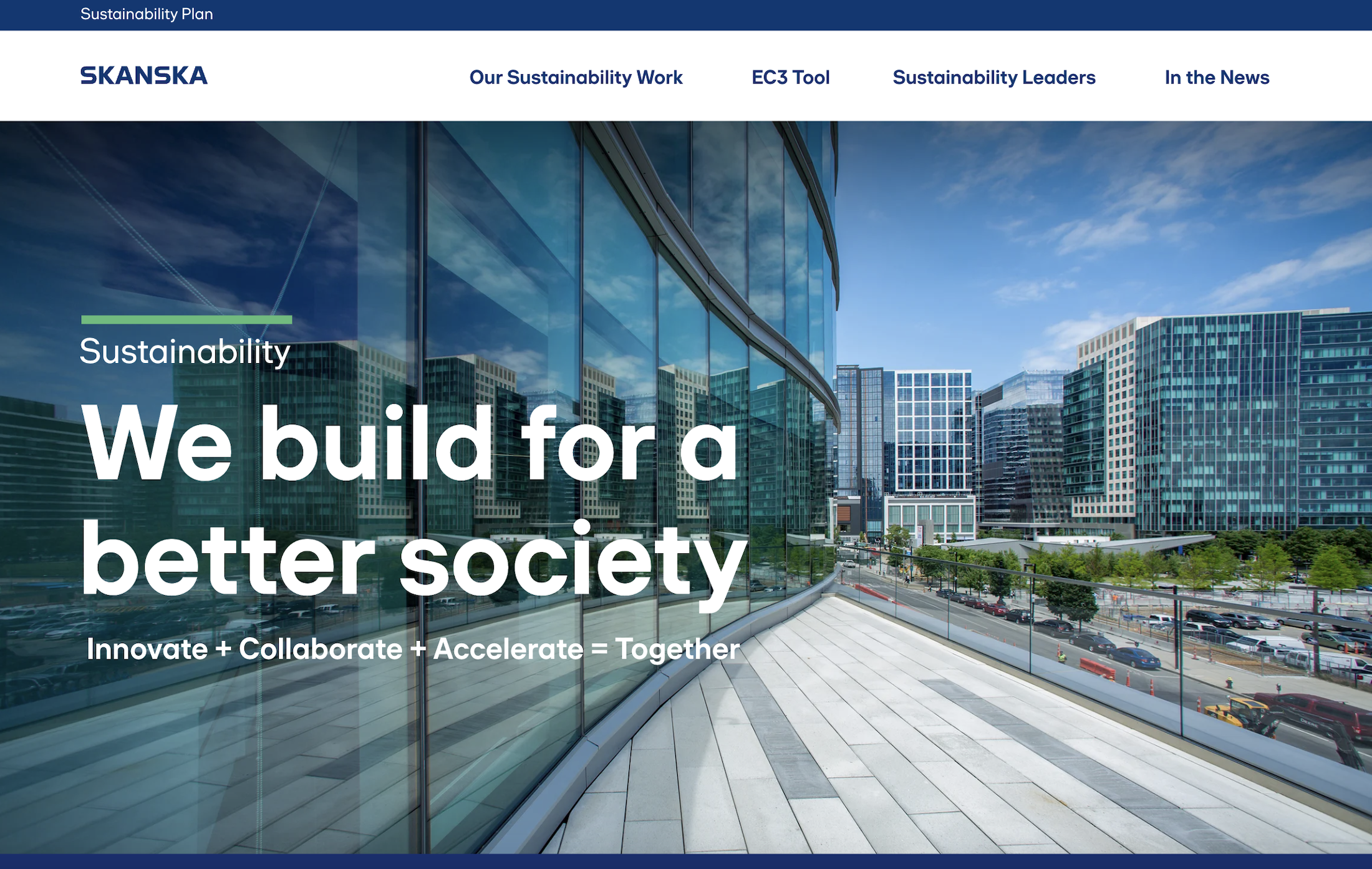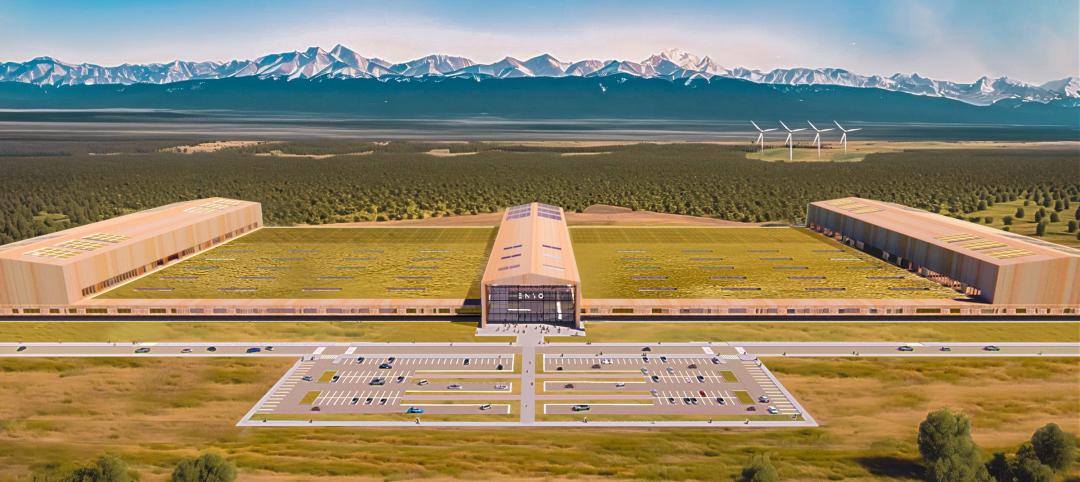Skanska, a global leader in sustainable building, has restructured its Sustainability Team to better serve client and company goals. Co-led by Steve Clem and Myrrh Caplan, who together bring decades of experience, the team will allow Skanska to continue to set the bar for the industry.
“Steve and Myrrh are central to our commitment to sustainability,” said Steve Stouthamer, Executive Vice President, Project Planning, Skanska USA Building. “As Senior Vice Presidents, they’ll leverage Skanska’s global and domestic initiatives to protect our environment and ensure the resilience of the communities we build in. By harnessing their collective expertise, we can make significant strides toward our decarbonization goals while continuing to set the bar for sustainable industry practices.”
With Clem and Caplan at the helm, Skanska is well positioned to support clients and maximize opportunities for sustainability consulting, as state and federal agencies implement stricter sustainability requirements for buildings and construction. Skanska’s robust Sustainability Team, located throughout the country, will continue supporting Clem and Caplan with helping clients meet and exceed their sustainability goals, advancing industry and client outcomes through innovation and research, and identifying opportunities to create more value-add solutions.
Since joining Skanska as a Project Manager in 2005, Caplan has helped shape Skanska’s national approach to sustainable building. She established the company’s first national Green Construction program and chaired Skanska’s first National Green Council. Throughout the past decade, she has managed multiple initiatives including carbon lifecycle analysis and efforts that benefit clients and the industry. Caplan leads Skanska's National Sustainability Team, made up of consultants and advisors.
Caplan was named a 2022 LEED Fellow by the U.S. Green Building Council (USGBC), one of twenty professionals from around the world recognized for their work in advancing green building practices. To date, Caplan has advised on nearly 300 certified projects and projects seeking LEED, Living Building Challenge, WELL, Envision, and other certifications. In 2023, Caplan co-created the Associated General Contractors of America Task Force on Decarbonization and Carbon Reporting to address the challenges around reporting and reducing carbon emissions within construction. She sits on the board of mindfulMaterials, serves on several industry committees, and participates in research with key partners.
Steve Clem joined Skanska as a project engineer in 1997 and over the years, established himself as one of Skanska’s staunchest sustainability leaders. In his role, Clem is responsible for setting and achieving Skanska’s decarbonization goals in the United States and works with construction teams to identify sustainable procurement solutions for clients including the use of mass timber. Clem’s efforts to reduce the industry’s embodied carbon began over 15 years ago and he has been influencing procurement with the Embodied Carbon in Construction Calculator (EC3 Tool) since Skanska co-created and launched the tool in 2019. Clem has also authored multiple cost studies that demystify the adoption of environmentally preferable construction strategies.
Clem spearheaded Skanska’s early participation in the Living Building Challenge – first with the influential Living Building Challenge Financial Study and then with the Bertschi School project. He holds certifications from the US Green Building Council, International Living Future Institute, and OSHA, among other accrediting agencies. Clem is also president of the construction safety non-profit, SafeBuild Alliance, and sits on the board of Building Transparency, which manages the EC3 Tool.
The built environment accounts for nearly 40 percent of carbon emissions globally, with approximately 11 percent embodied in construction materials and an estimated 28 percent stemming from building operations. To reduce its impact on the planet, Skanska has had a long trajectory of environmental accomplishments under Clem and Caplan’s leadership:
- Skanska set an ambitious target to achieve carbon neutrality by 2045 in its own operations and across its entire value chain. As an interim target, its development operations aim to achieve a 70 percent reduction by 2030.
- Skanska has been working on mass timber projects for more than a decade, improving construction schedules while reaping the environmental, health, and aesthetic benefits.
- Skanska has delivered over 44 million square feet of space that has been certified across several systems including LEED®, Envision™, Green Globes, Fitwel and Living Building Challenge. On our own development projects, we target a minimum of LEED® Gold, with many projects achieving LEED Platinum.
- Skanska supports the United Nations Sustainable Development Goals to address issues like climate action, sustainable cities and communities, and responsible consumption and production.
- Skanska is ISO 14001 certified to ensure consistent environmental performance and continuous improvement. Skanska’s ISO 14001 certification program has been recognized by the U.S. Green Building Council.
- Skanska partners with organizations to transform the industry, investing in research and technology, and pioneering sustainable construction practices.
More Information on Skanska’s Sustainability Initiatives:
About Skanska
Skanska uses knowledge & foresight to shape the way people live, work, and connect. More than 135 years in the making, we’re one of the world’s largest development and construction companies. We operate in select markets throughout the Nordics, Europe and the United States. Skanska in the U.S. is headquartered in New York City with 29 offices around the country. In 2022, construction in the U.S. generated $6.9 billion in revenue, and as a developer in the U.S., Skanska has invested a total of $3.5 billion in commercial and multi-family projects. Together with our customers and the collective expertise of our 6,500 teammates in the U.S. and 28,000 globally, we create innovative and sustainable solutions that support healthy living beyond our lifetime.
Related Stories
Resiliency | Oct 29, 2024
Climate change degrades buildings slowly but steadily
While natural disasters such as hurricanes and wildfires can destroy buildings in minutes, other factors exacerbated by climate change degrade buildings more slowly but still cause costly damage.
Sustainable Design and Construction | Oct 10, 2024
Northglenn, a Denver suburb, opens a net zero, all-electric city hall with a mass timber structure
Northglenn, Colo., a Denver suburb, has opened the new Northglenn City Hall—a net zero, fully electric building with a mass timber structure. The 32,600-sf, $33.7 million building houses 60 city staffers. Designed by Anderson Mason Dale Architects, Northglenn City Hall is set to become the first municipal building in Colorado, and one of the first in the country, to achieve the Core certification: a green building rating system overseen by the International Living Future Institute.
K-12 Schools | Sep 30, 2024
The importance of selecting healthy materials for K-12 projects
Clark Nexsen interior designers Anna Claire Beethoven and Brittney Just, CID, IIDA, LEED Green Associate, share why it is imperative to specify healthy building materials in K-12 schools.
Sustainability | Sep 18, 2024
3 living buildings made by a living practice
Prompting humans to reexamine our relationship to the environment, architecture creates the opportunity for us to physically experience ideas of beauty, performance, and structure through the distinct lens of place.
Office Buildings | Sep 6, 2024
Fact sheet outlines benefits, challenges of thermal energy storage for commercial buildings
A U.S. Dept. of Energy document discusses the benefits and challenges of thermal energy storage for commercial buildings. The document explains how the various types of thermal energy storage technologies work, where their installation is most beneficial, and some practical considerations around installations.
Industrial Facilities | Aug 28, 2024
UK-based tire company plans to build the first carbon-neutral tire factory in the U.S.
ENSO, a U.K.-based company that makes tires for electric vehicles, has announced plans to build the first carbon-neutral tire factory in the U.S. The $500 million ENSO technology campus will be powered entirely by renewable energy. The first-of-its-kind tire factory aims to be carbon neutral without purchased offsets, using carbon-neutral raw materials and building materials.
Government Buildings | Aug 19, 2024
GSA posts new RFI for enabling energy efficiency, decarbonization in commercial buildings
The U.S. General Services Administration (GSA), in collaboration with the U.S. Department of Energy, recently released a new Request For Information (RFI) focused on enabling energy efficiency and decarbonization in commercial buildings. GSA wants to test innovative technologies through GSA’s Center for Emerging Building Technologies.
Adaptive Reuse | Aug 14, 2024
KPF unveils design for repositioning of Norman Foster’s 8 Canada Square tower in London
8 Canada Square, a Norman Foster-designed office building that’s currently the global headquarters of HSBC Holdings, will have large sections of its façade removed to create landscaped terraces. The project, designed by KPF, will be the world’s largest transformation of an office tower into a sustainable mixed-use building.
Sustainability | Aug 14, 2024
World’s first TRUE Zero Waste for Construction-certified public project delivered in Calif.
The Contra Costa County Administration Building in Martinez, Calif., is the world’s first public project to achieve the zero-waste-focused TRUE Gold certification for construction. The TRUE Certification for Construction program, administered by Green Business Certification Inc. (GBCI), recognizes projects that achieve exceptional levels of waste reduction, reuse, and recycling.
Energy Efficiency | Aug 9, 2024
Artificial intelligence could help reduce energy consumption by as much as 40% by 2050
Artificial intelligence could help U.S. buildings to significantly reduce energy consumption and carbon emissions, according to a paper by researchers at the Lawrence Berkeley National Laboratory.

















